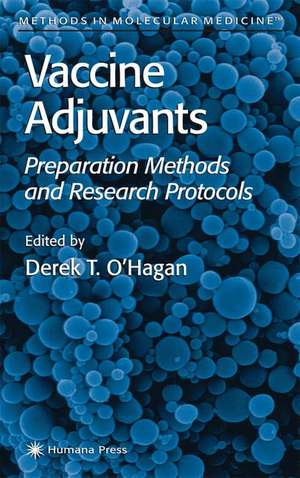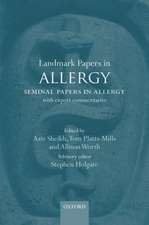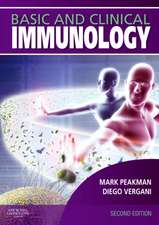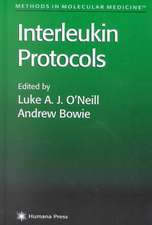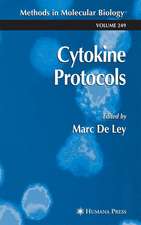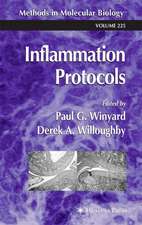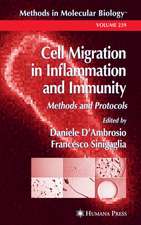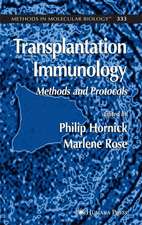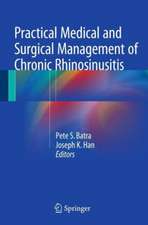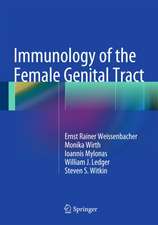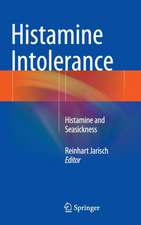Vaccine Adjuvants: Preparation Methods and Research Protocols: Methods in Molecular Medicine, cartea 42
Editat de Derek T. O’Haganen Limba Engleză Hardback – 15 apr 2000
| Toate formatele și edițiile | Preț | Express |
|---|---|---|
| Paperback (1) | 1287.53 lei 6-8 săpt. | |
| Humana Press Inc. – 9 noi 2010 | 1287.53 lei 6-8 săpt. | |
| Hardback (1) | 1295.04 lei 6-8 săpt. | |
| Humana Press Inc. – 15 apr 2000 | 1295.04 lei 6-8 săpt. |
Din seria Methods in Molecular Medicine
- 5%
 Preț: 1278.74 lei
Preț: 1278.74 lei - 15%
 Preț: 655.78 lei
Preț: 655.78 lei - 5%
 Preț: 1106.50 lei
Preț: 1106.50 lei - 5%
 Preț: 727.44 lei
Preț: 727.44 lei - 5%
 Preț: 1108.72 lei
Preț: 1108.72 lei - 15%
 Preț: 650.55 lei
Preț: 650.55 lei - 5%
 Preț: 735.66 lei
Preț: 735.66 lei - 18%
 Preț: 947.35 lei
Preț: 947.35 lei - 18%
 Preț: 948.92 lei
Preț: 948.92 lei - 5%
 Preț: 1114.54 lei
Preț: 1114.54 lei - 5%
 Preț: 1114.91 lei
Preț: 1114.91 lei - 15%
 Preț: 658.55 lei
Preț: 658.55 lei - 5%
 Preț: 734.01 lei
Preț: 734.01 lei - 5%
 Preț: 1111.61 lei
Preț: 1111.61 lei - 5%
 Preț: 1104.32 lei
Preț: 1104.32 lei - 5%
 Preț: 723.21 lei
Preț: 723.21 lei - 5%
 Preț: 1106.13 lei
Preț: 1106.13 lei - 5%
 Preț: 723.05 lei
Preț: 723.05 lei - 5%
 Preț: 1108.35 lei
Preț: 1108.35 lei - 5%
 Preț: 723.42 lei
Preț: 723.42 lei - 5%
 Preț: 1115.65 lei
Preț: 1115.65 lei - 5%
 Preț: 786.86 lei
Preț: 786.86 lei - 5%
 Preț: 1133.01 lei
Preț: 1133.01 lei - 5%
 Preț: 1114.71 lei
Preț: 1114.71 lei
Preț: 1295.04 lei
Preț vechi: 1363.19 lei
-5% Nou
Puncte Express: 1943
Preț estimativ în valută:
247.79€ • 258.75$ • 204.63£
247.79€ • 258.75$ • 204.63£
Carte tipărită la comandă
Livrare economică 16-30 aprilie
Preluare comenzi: 021 569.72.76
Specificații
ISBN-13: 9780896037359
ISBN-10: 0896037355
Pagini: 342
Ilustrații: X, 342 p.
Dimensiuni: 155 x 235 x 26 mm
Greutate: 0.7 kg
Ediția:2000
Editura: Humana Press Inc.
Colecția Humana
Seria Methods in Molecular Medicine
Locul publicării:Totowa, NJ, United States
ISBN-10: 0896037355
Pagini: 342
Ilustrații: X, 342 p.
Dimensiuni: 155 x 235 x 26 mm
Greutate: 0.7 kg
Ediția:2000
Editura: Humana Press Inc.
Colecția Humana
Seria Methods in Molecular Medicine
Locul publicării:Totowa, NJ, United States
Public țintă
ResearchCuprins
An Overview of Adjuvant Use.- Harmful and Beneficial Activities of Immunological Adjuvants.- Freund's Adjuvants.- Aluminum Compounds as Vaccine Adjuvants.- Poly(Lactide-Coglycolide) Microparticles As Vaccine Adjuvants.- Poly(Methyl Methacrylate) Nanoparticles As Vaccine Adjuvants.- Aqueous Formulation of Adjuvant-Active Nonionic Block Copolymers.- Liposomes As Immunological Adjuvants and Vaccine Carriers.- Immunopotentiating Reconstituted Influenza Virosomes (IRIVs).- Cochleates for Induction of Mucosal and Systemic Immune Responses.- Virus-like Particles As Vaccine Adjuvants.- The Adjuvant MF59: A 10-Year Perspective Gary Ott, Ramachandran Radhakrishnan,.- Preparation of the Syntex Adjuvant Formulation (SAF, SAF-m, and SAF-1).- The ISCOM™ Technology.- QS-21 Adjuvant.- MPL® Immunostimulant: Adjuvant Formulations.- Cytokines As Vaccine Adjuvants: The Use of Interleukin-2.- DNA As an Adjuvant.- Transcutaneous Immunization.- Mutant Heat-Labile Entertoxins As Adjuvants for CTL Induction.
Recenzii
"This book is a welcome addition to the rapidly expending field of immunological adjuvant. The editor has done an outstanding job in persuading experts both from industry and academic institutions to contribute in a wide range of topics on vaccine adjuvants. This book should be valuable for researchers working in the area of vaccine development for infectious diseases, cancer, autoimmune diseases, and modulation of reproduction and animal productivity.Three chapters, An Overview of Adjuvant Use; Harmful and Beneficial Activities of Immunological Adjuvants; and Transcutaneous Immunization, provide excellent basic information that should be of interest to both new and established researchers in the area of vaccine development....Overall, this is an excellent comprehensive book on vaccine adjuvants."-Pharmaceutical Research
"...provides a very good overview on the mechanisms, procedures for applications and partial comparisons of different adjuvants, starting from classical Freund's adjuvants and aluminum hydroxide/phosphate to poly (lactide-coglycolide) microparticles, poly(methyl methacrylate) nanoparticles, non-ionic block copolymers, liposomes, including immunostimulatory complexes....The volumes is likely to be widely consulted in many areas of experimental and clinical microbiological sciences where protection of the population from infection by vaccines is the main aim of the research." - MicroBiology Today
"...provides a very good overview on the mechanisms, procedures for applications and partial comparisons of different adjuvants, starting from classical Freund's adjuvants and aluminum hydroxide/phosphate to poly (lactide-coglycolide) microparticles, poly(methyl methacrylate) nanoparticles, non-ionic block copolymers, liposomes, including immunostimulatory complexes....The volumes is likely to be widely consulted in many areas of experimental and clinical microbiological sciences where protection of the population from infection by vaccines is the main aim of the research." - MicroBiology Today
Textul de pe ultima copertă
Adjuvants play a key role in controlling the efficacy of vaccines, through enhancing the immune response to vaccine antigens, including recombinant proteins, protein polysaccharide conjugates, synthetic peptides, or DNA. In Vaccine Adjuvants: Preparation Methods and Research Protocols, Derek T. O'Hagan and a team of expert vaccinologists and pharmacologists thoroughly describe the preparation, characterization, and evaluation of a wide range of alternative vaccine adjuvants for use in preclinical studies. Each chapter carefully reviews a single adjuvant, including suggestions why a specific adjuvant might be preferred for a given antigen, depending on what type of immune response is desired. Alternate adjuvant choices are also presented so that researchers can choose those most efficacious for their specific purpose. The methods, described in full detail, range from the simple mixing of an antigen with a preformed adjuvant, to a complex preparation process requiring the antigens to be physically associated, or entrapped within, an adjuvant formulation.
Comprehensive and highly practical, Vaccine Adjuvants: Preparation Methods and Research Protocols provides an effective guide to making and using vaccine adjuvants. By closely following directions from the book, today's researchers will be able optimally to induce specific immune responses against different types of antigens and to selectively manipulate the immune response in a favorable way. The use of the information in this book will promote the development of powerful new vaccines against infectious diseases and cancers, and may promote the development of products to ameliorate autoimmune disorders.
Caracteristici
Includes supplementary material: sn.pub/extras
